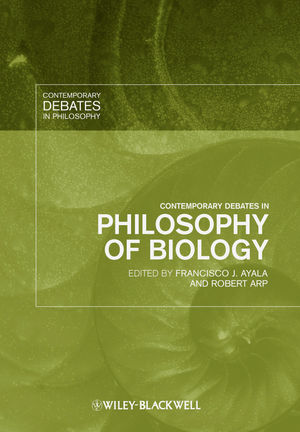Contemporary Debates in Philosophy of BiologyISBN: 978-1-4051-5998-2
Hardcover
440 pages
December 2009, Wiley-Blackwell
 This is a Print-on-Demand title. It will be printed specifically to fill your order. Please allow an additional 15-20 days delivery time. The book is not returnable.
Other Available Formats: Paperback
|
||||||
Notes on Contributors ix
General Introduction 1
References and Further Reading 7
Part I Is It Possible To Reduce Biological Explanations To Explanations In Chemistry and/or Physics? 13
Introduction 13
References and Further Reading 15
1 It is Possible to Reduce Biological Explanations to Explanations in Chemistry and/or Physics 19
Evelyn Fox Keller
2 It is Not Possible to Reduce Biological Explanations to Explanations in Chemistry and/or Physics 32
John Dupré
Part II Have Traits Evolved To Function the Way They Do Because of a Past Advantage? 49
Introduction 49
References and Further Reading 51
3 Traits Have Evolved to Function the Way They Do Because of a Past Advantage 53
Mark Perlman
4 Traits Have Not Evolved to Function the Way They Do Because of a Past Advantage 72
Robert Cummins and Martin Roth
Part III Are Species Real? 87
Introduction 87
References and Further Reading 88
5 Species Are Real Biological Entities 91
Michael F. Claridge
6 Species Are Not Uniquely Real Biological Entities 110
Brent D. Mishler
Part IV Does Selection Operate Primarily On Genes? 123
Introduction 123
References and Further Reading 125
7 Selection Does Operate Primarily on Genes: In Defense of the Gene as the Unit of Selection 127
Carmen Sapienza
8 Selection Does Not Operate Primarily on Genes 141
Richard M. Burian
Part V Are Microevolution and Macroevolution Governed By the Same Processes? 165
Introduction 165
References and Further Reading 166
9 Microevolution and Macroevolution Are Governed by the Same Processes 169
Michael R. Dietrich
10 Microevolution and Macroevolution Are Not Governed by the Same Processes 180
Douglas H. Erwin
Part VI Does Evolutionary Developmental Biology Offer a Significant Challenge To the Neo-Darwinian Paradigm? 195
Introduction 195
References and Further Reading 197
11 Evolutionary Developmental Biology Offers a Significant Challenge to the Neo-Darwinian Paradigm 199
Manfred D. Laubichler
12 Evolutionary Developmental Biology Does Not Offer a Significant Challenge to the Neo-Darwinian Paradigm 213
Alessandro Minelli
Part VII Were the Basic Components of the Human Mind Solidified During the Pleistocene Epoch? 227
Introduction 227
References and Further Reading 228
13 The Basic Components of the Human Mind Were Solidified During the Pleistocene Epoch 231
Valerie G. Starratt and Todd K. Shackelford
14 The Basic Components of the Human Mind Were Not Solidified During the Pleistocene Epoch 243
Stephen M. Downes
Part VIII Does Memetics Provide a Useful Way of Understanding Cultural Evolution? 253
Introduction 253
References and Further Reading 254
15 Memetics Does Provide a Useful Way of Understanding Cultural Evolution 255
Susan Blackmore
16 Memetics Does Not Provide a Useful Way of Understanding Cultural Evolution: A Developmental Perspective 273
William C. Wimsatt
Part IX Can the Biological Sciences Act As a Ground For Ethics? 293
Introduction 293
References and Further Reading 295
17 The Biological Sciences Can Act as a Ground for Ethics 297
Michael Ruse
18 What the Biological Sciences Can and Cannot Contribute to Ethics 316
Francisco J. Ayala
Part X Is There a Place For Intelligent Design In the Philosophy of Biology? 337
Introduction 337
References and Further Reading 340
19 There is a Place for Intelligent Design in the Philosophy of Biology: Intelligent Design in (Philosophy of) Biology: Some Legitimate Roles 343
Del Ratzsch
20 There is No Place for Intelligent Design in the Philosophy of Biology: Intelligent Design is Not Science 364
Francisco J. Ayala
Index 391



